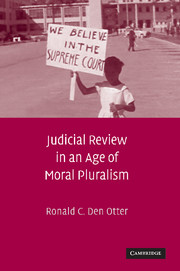Book contents
- Frontmatter
- Contents
- Acknowledgments
- Introduction
- 1 Public Justification and Constitutional Theory
- 2 Freedom and Equality in Constitutional History
- 3 The Challenge of Public Justification
- 4 Competing Conceptions of Public Reason
- 5 Constitutional Public Reason
- 6 The Limits of Public Justification
- 7 Standard Objections to Public Reason
- 8 Easier Cases
- 9 Harder Cases
- 10 The Case for Judicial Review
- Conclusion
- References
- Index
- References
10 - The Case for Judicial Review
Published online by Cambridge University Press: 17 December 2010
- Frontmatter
- Contents
- Acknowledgments
- Introduction
- 1 Public Justification and Constitutional Theory
- 2 Freedom and Equality in Constitutional History
- 3 The Challenge of Public Justification
- 4 Competing Conceptions of Public Reason
- 5 Constitutional Public Reason
- 6 The Limits of Public Justification
- 7 Standard Objections to Public Reason
- 8 Easier Cases
- 9 Harder Cases
- 10 The Case for Judicial Review
- Conclusion
- References
- Index
- References
Summary
Scholars who write about public justification and deliberative democracy usually have little to say about judicial review. This neglect may be due to their preoccupation with citizenship. Rather than putting institutions front and center, as many empirical political scientists do, they write about how ordinary people must think and behave in certain ways when they participate in politics. There is nothing wrong with this focus, and those who hope that Americans politics can become more principled and more deliberative have come up with some ingenious plans for adapting the “ideal of face-to-face democracy to the large nation-state.” As I see it, the prominence of the judiciary in our contemporary politics also merits an account of the proper relationship between judicial decision making and the ideal of public deliberation that deliberative democrats envision. Any theory of deliberative democracy that is premised on the notion that citizens are supposed to deliberate in the public sphere cannot pretend that courts do not exist and overlook the fact that most Americans continue to put their faith in them.
According to many accounts, the framers were republicans who rejected more populist forms of democracy and believed that the wisest men should exercise political power subject to institutional checks and balances. That sounds unacceptably elitist to contemporary democratic ears, and few of us today would be comfortable with the notion that our elected representatives should feel free to ignore public opinion because they are more virtuous, more disinterested, more intelligent, or more knowledgeable than the people.
- Type
- Chapter
- Information
- Judicial Review in an Age of Moral Pluralism , pp. 291 - 315Publisher: Cambridge University PressPrint publication year: 2009



